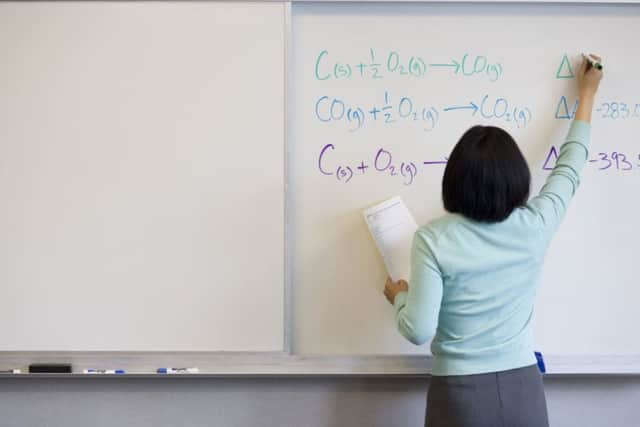Concerns over '˜diluted' teacher training standards
This article contains affiliate links. We may earn a small commission on items purchased through this article, but that does not affect our editorial judgement.
Experts have been quick to criticise the move which they say could dilute the quality of training for teachers and the overall standards of education.
Due to the difficulties in recruitment, universities have been encourages to accept applicants, even if they do not hold a higher in English and standard grade in maths.
Advertisement
Hide AdAdvertisement
Hide AdApplicants will instead be accepted if they agree to gain a school qualification which they will obtain at the same time as their training.


The move has been heavily criticised by experts who insist that the lack of qualifications initially upon applying indicates that they cannot successfully teach.
Concerns have also been raised over the workloads of those who need to gain additional qualifications as well as study.
Existing guidance published by the General Teaching Council for Scotland, will be rewritten. At present it states that a higher-level qualification in English is “an essential requirement for entry to all teacher education programmes”.


Under said guidance a standard grade in maths or equivalent is also an “essential minimum requirement”.
However, a memo
A memo published yesterday by the Scottish Funding Council urged universities to grant students access to courses regardless of whether they had the correct qualifications.
The memo reads: “For example, a STEM [science, technology, engineering and maths] graduate who does not have higher English could study for an appropriate award alongside their [teacher education] studies.
“Universities are requested [to take] flexibility into account for subjects that are difficult to fill.”
Advertisement
Hide AdAdvertisement
Hide AdAccording to data, almost a third of places on postgraduate teacher training courses for secondary schools were unfilled, with larger shortfalls in English and maths.
This in turn led to a change in entry standards from many unversities.
Speaking to The Times, Lindsay Paterson, professor of educational policy at the University of Edinburgh said: “More than primary-level mathematics is required to be able to understand how educational testing works.
“A quite advanced level of literacy is required to read educational research or policy documents.
“A student without these prior qualifications would be likely to struggle with core elements of teacher- education courses.
“That risks putting pressure on universities to make their courses easier [which] risks reducing the academic level reached by graduates from teacher-education courses.”
Keir Bloomer, the educationalist, said the way to address the teacher shortage was by improving pay and job satisfaction. “If there is official encouragement to admit students into training who are not meeting the basic requirements of English and maths, that is dangerous and retrograde,” he said.
The General Teaching Council for Scotland (GTCS) said its guidelines were being changed to reflect “flexibility” in entry requirements.
Advertisement
Hide AdAdvertisement
Hide AdA spokesman said: “While our memorandum on entry requirements to initial teacher education states that higher English and national 5 mathematics are a minimum requirement for initial teacher education, universities are granted flexibility when deciding the acceptability of individual qualifications.
A Scottish government spokeswoman said: “This is a common-sense approach. Higher English and SCQF level 5 maths still remain a requirement of entry into initial teacher education, but this flexibility allows student teachers to study for the requirements while completing their training. Clearly we expect universities to exercise appropriate judgment when applying these flexibilities.
“We welcome the flexibility that the GTCS has already put in place to help individuals meet the entry requirements for teaching.”
